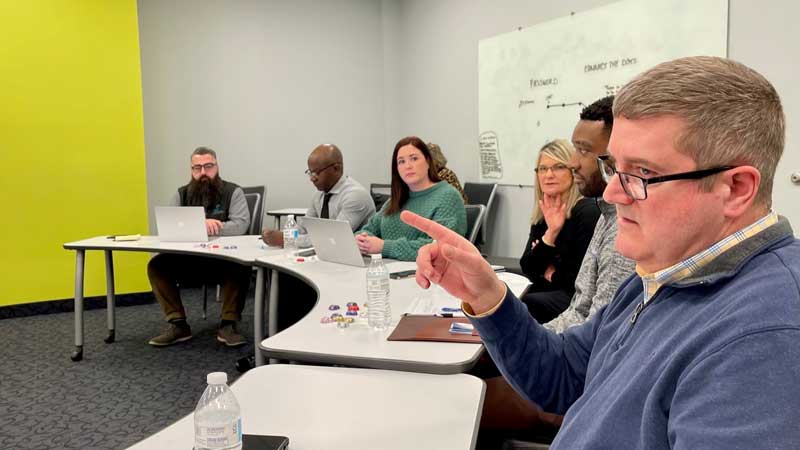Any business or organization paying attention to employees and the health of an operation should be discussing job quality. What’s good for one company might not work for another. It’s a task that continues to change along with the workforce.
On March 16, the Mahoning Valley Manufacturers Coalition hosted a job quality roundtable with at least 45 participants featuring Rebecca Kusner. She’s a workforce development connector, strategist, and advocate in Northeast Ohio. She founded R4 Workforce, which is a consulting firm just outside Cleveland, Ohio. Kusner presented in the area about two years ago, and the MVMC felt it was important to bring her back for updated research and thoughts on the topic.
Evolving definition of job quality
Kusner started the presentation by asking participants what job quality meant to them. Answers included high value, high pay, safety (both physical and mental), work-life balance, team environment and opportunity for learning. She was pleased to hear safety mentioned because she feels it can often be overlooked.
She points out there’s no single definition or standard that works for everyone, but it must be about the overall framework for job quality. She used an entry-level job as an example. It might have a lower pay standard, but that doesn’t make the position a “bad” starting point. It’s about making each job the best it can be for employees.
“I’m becoming less enamored with the word ‘job quality’ for two reasons: One, because it’s so variable. Two, because it makes it just about the job when it’s about team, culture and other things. You’re not going to make a place better by fixing one job,” Kusner said. “I’m trying to figure out what is the right word. You’ll hear about job design, workplace strategies, and job quality is easy at this point because that’s what people have been hearing about,” she added.
Kusner also feels it has a negative connotation, or that it reflects something bad, when that’s not always the case.
“It’s just the term given to this whole cluster of things that influences an individual’s connection to work,” Kusner said.

The future of work is now
Kusner notes the increasing economic polarization, more virtual interaction and automation in the workforce. She says businesses and organizations need to have programs, systems, interventions, conversations and an ecosystem that responds to the future in the workplace.
She believes companies need to react in new ways to the issues present in the field. She acknowledges that in some cases the challenge is money coming from the government and philanthropic programs that have their own ideas of how things need to be done.
“Job quality work fits in the future of workforce development; how we think about the intersection of people and work, and what we do about it. We can choose how to support companies and workers,” Kusner said.
Facing disparities and DEI
Kusner showcased another changing factor in the Mahoning Valley when it comes to jobs. She said there’s been more skills-based hiring going on, as well as more worker voice and worker power movements happening.
“There’s the notion of equity and inclusion and seeing disparities in the workforce, access to opportunity and how we address equity and inclusion. It’s certainly needing to be part of this emerging workforce,” Kusner said.
She says when employers ask to see what potential hires can do, then focus on those competencies, it automatically helps with DEI.
Navigating a multigenerational workforce
Many companies have a multigenerational workforce, and job quality can mean something different to each one.
“It’s something I’ve seen highlighted a great deal in conversations with younger workers. They will show up and work, but they need to be valued and appreciated for everything they are and not just their work product,” Kusner said.
Vallourec North America Talent Management Director Chris Allen sees the dynamic talking to workers at the Youngstown plant.
“The needs are different from generation to generation. Older generations do the job and don’t have many questions. Others need to have more feeling put into the job and be told they’re doing well,” Allen said.
Kusner emphasizes Allen’s effort to talk with employees and how important it is for management to know the issues going on and how dynamics change. She feels this plays a major role in having a quality workplace.
Improvement tools
Kusner believes companies want to make progress when it comes to job quality. She also recognizes, for some, it’s no easy task.
“There are good companies out there that don’t have the knowledge, resources or support to do all of this. I don’t want this to seem like they’re doing a lousy job,” Kusner said.
She recommends online assessment tools to get the ball rolling. Talent Rewire’s opportunity navigator helps employers understand where they excel and where change is necessary to create a more inclusive workplace. Then, results are sent with resources to take tangible actions for improvement.
“It’s all about starting somewhere, and online assessments are practical, actionable and easy,” Kusner said.

